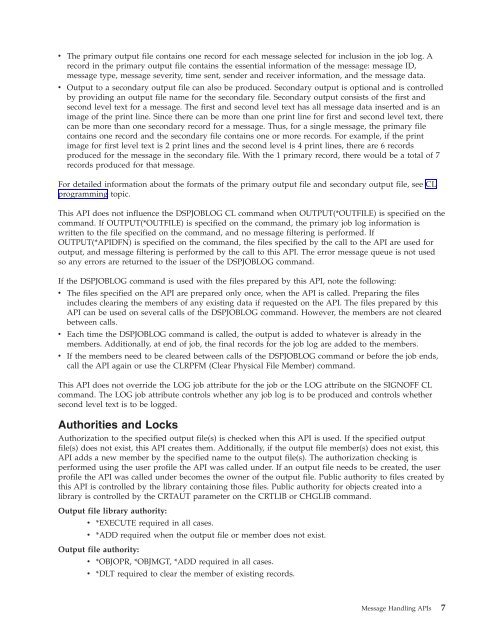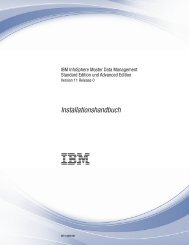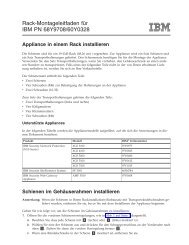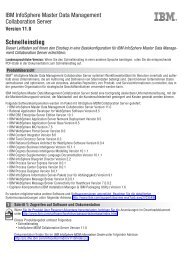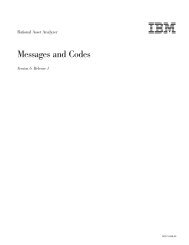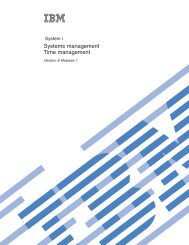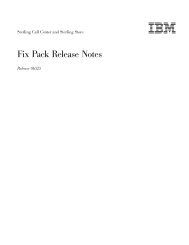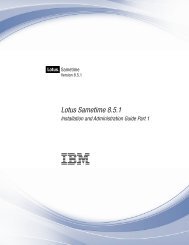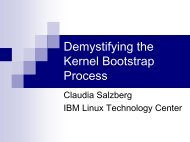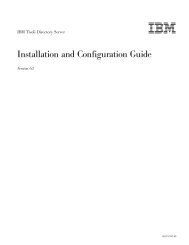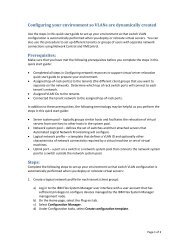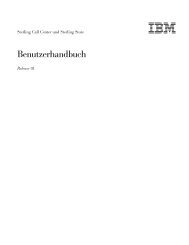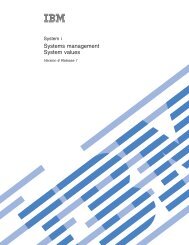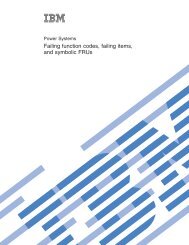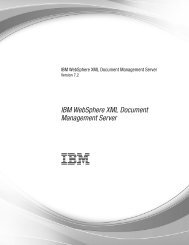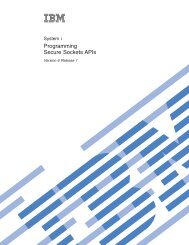System i: Programming Message Handling APIs - IBM
System i: Programming Message Handling APIs - IBM
System i: Programming Message Handling APIs - IBM
You also want an ePaper? Increase the reach of your titles
YUMPU automatically turns print PDFs into web optimized ePapers that Google loves.
v The primary output file contains one record for each message selected for inclusion in the job log. A<br />
record in the primary output file contains the essential information of the message: message ID,<br />
message type, message severity, time sent, sender and receiver information, and the message data.<br />
v Output to a secondary output file can also be produced. Secondary output is optional and is controlled<br />
by providing an output file name for the secondary file. Secondary output consists of the first and<br />
second level text for a message. The first and second level text has all message data inserted and is an<br />
image of the print line. Since there can be more than one print line for first and second level text, there<br />
can be more than one secondary record for a message. Thus, for a single message, the primary file<br />
contains one record and the secondary file contains one or more records. For example, if the print<br />
image for first level text is 2 print lines and the second level is 4 print lines, there are 6 records<br />
produced for the message in the secondary file. With the 1 primary record, there would be a total of 7<br />
records produced for that message.<br />
For detailed information about the formats of the primary output file and secondary output file, see CL<br />
programming topic.<br />
This API does not influence the DSPJOBLOG CL command when OUTPUT(*OUTFILE) is specified on the<br />
command. If OUTPUT(*OUTFILE) is specified on the command, the primary job log information is<br />
written to the file specified on the command, and no message filtering is performed. If<br />
OUTPUT(*APIDFN) is specified on the command, the files specified by the call to the API are used for<br />
output, and message filtering is performed by the call to this API. The error message queue is not used<br />
so any errors are returned to the issuer of the DSPJOBLOG command.<br />
If the DSPJOBLOG command is used with the files prepared by this API, note the following:<br />
v The files specified on the API are prepared only once, when the API is called. Preparing the files<br />
includes clearing the members of any existing data if requested on the API. The files prepared by this<br />
API can be used on several calls of the DSPJOBLOG command. However, the members are not cleared<br />
between calls.<br />
v Each time the DSPJOBLOG command is called, the output is added to whatever is already in the<br />
members. Additionally, at end of job, the final records for the job log are added to the members.<br />
v If the members need to be cleared between calls of the DSPJOBLOG command or before the job ends,<br />
call the API again or use the CLRPFM (Clear Physical File Member) command.<br />
This API does not override the LOG job attribute for the job or the LOG attribute on the SIGNOFF CL<br />
command. The LOG job attribute controls whether any job log is to be produced and controls whether<br />
second level text is to be logged.<br />
Authorities and Locks<br />
Authorization to the specified output file(s) is checked when this API is used. If the specified output<br />
file(s) does not exist, this API creates them. Additionally, if the output file member(s) does not exist, this<br />
API adds a new member by the specified name to the output file(s). The authorization checking is<br />
performed using the user profile the API was called under. If an output file needs to be created, the user<br />
profile the API was called under becomes the owner of the output file. Public authority to files created by<br />
this API is controlled by the library containing those files. Public authority for objects created into a<br />
library is controlled by the CRTAUT parameter on the CRTLIB or CHGLIB command.<br />
Output file library authority:<br />
v *EXECUTE required in all cases.<br />
v *ADD required when the output file or member does not exist.<br />
Output file authority:<br />
v *OBJOPR, *OBJMGT, *ADD required in all cases.<br />
v *DLT required to clear the member of existing records.<br />
<strong>Message</strong> <strong>Handling</strong> <strong>APIs</strong> 7


